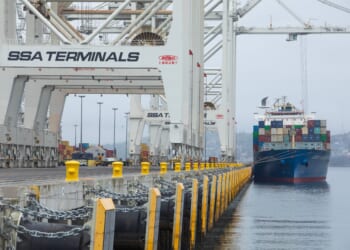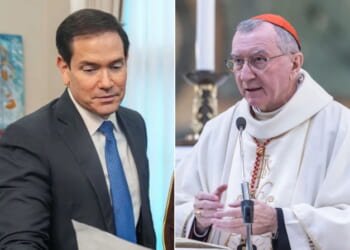Joe Harrison is a Researcher at the think tank Bright Blue.
The past fortnight has undeniably been one of the most chaotic periods of French politics in this century.
In the space of just two weeks, France has seen its government formed, collapsed, hastily reassembled, and subsequently pummelled by two no-confidence votes, bringing the nation’s ungovernability into stark relief.
However, amidst the upheaval, it is not President Emmanuel Macron who has seen the sharpest reversal of fortunes – nor even his embattled Prime Minister, Sébastien Lecornu – but rather the one-time torchbearer of French centre-right revival: Bruno Retailleau.
Lecornu’s second Government survived two no-confidence votes last Thursday – one of which came just 18 votes short of success. However, one notable casualty was the momentum that Retailleau had been slowly building around France’s traditional centre-right party, the Republicans, after he helped to trigger Lecornu’s first Government to collapse.
Since winning almost 400 of the French National Assembly’s 577 seats in 2002, the Republicans – formerly known as the Union for a Popular Movement (UMP) – have shrunk in each successive legislative election. Today, they hold just 48 seats. However, when Retailleau won the party’s leadership election in May, things seemed finally to be turning around.
Retailleau doesn’t tick every box for a leader looking to reunite the French centre-right diaspora. Indeed, as I wrote back in June, his hardline conservatism speaks more to Marine Le Pen’s supporters than the Macronists he would realistically need to rally for a shot at the presidency in 2027. However, until recently, he boasted an ideal campaigning position founded on two key assets.
First: ostensible party unity. Not only did Retailleau win the Republicans’ leadership election with a dominant 74 per cent of the vote, he did so with remarkably little animosity either towards or from rival contender Laurent Wauquiez – leader of the Republicans’ group in the Assembly. In a party scarred by in-fighting and still reeling from a leadership-related schism in 2024, such unity is as rare as it is important.
Second: an elevated ministerial platform. As Interior Minister – and comfortably the most popular minister in the previous Government – Retailleau benefitted from the same credible platform that Nicholas Sarkozy used to win the Presidency back in 2007. Indeed, this ministerial office was a perfect position from which to execute a well-timed resignation from the Macronist regime. There are clear problems with being directly associated with a President of whom just 21.5 per cent of citizens have a favourable opinion. However, being able to publicly cut those ties at an opportune moment offered the chance for a massive campaigning boost.
Over the past fortnight, however, Retailleau has completely wasted this opportunity – and shredded his party’s unity in the process.
When Sébastien Lecornu named his Government two weeks ago, Retailleau vocally expressed his frustration with the ministerial appointments, strongly indicating that he would withdraw his support and thus triggering Lecornu’s resignation within less than 14 hours. Retailleau subsequently declared that he would not take part in any future Macronist-led Government, and that the centrist coalition – on which the past three Governments had depended – was therefore “dead.” However, Retailleau misjudged his moment. As it turned out, he was acting almost completely against the wishes of his parliamentary party, much of which was left baffled.
Wauquiez – reflecting the views of the rest of the Republicans’ Assembly members – declared that the party remained supportive of the Macronist coalition. Indeed, despite the party executive committee voting not to participate directly in Lecornu’s second Government, three former Republican ministers ignored the party line and returned to the posts they had vacated just days before.
Retailleau has therefore abandoned his advantageous ministerial platform, but instead of benefitting from a clear break with the Macronists, the Republican schism provoked by his decision means that his party will remain associated with this centrist coalition of convenience – and all of the misfortune that will inevitably come its way.
Most damning of all, however, is the fact that by collapsing Lecornu’s Government, Retailleau unwittingly encouraged his Republicans’ Assembly members to renege on their most basic political principles. In order to keep Lecornu’s second administration alive, Republican Assembly members were forced to support the Prime Minister in delaying Macron’s vitally important pension reforms until 2027 – the only way to appease the Socialist Party and prevent it joining the far left’s no-confidence vote.
Giving up on these essential reforms – which the Republicans have steadfastly supported since 2022 – makes a mockery of the party’s economic credibility, and puts me in the rare position of agreeing with Marine Le Pen, who remarked that the Republicans had “completely abandoned their principles.”
Given the current state of public opinion, it is entirely understandable that the Republicans are desperate to avoid going to the polls. If an election were held tomorrow, the party – polling at just 14 per cent – would be decimated once again. However, the fact is that this political catch-22 – electoral oblivion or abandoning all semblance of principle – is almost entirely Retailleau’s own fault. Most ironic of all is the fact that the ministerial appointment rumoured to have caused Retailleau to collapse Lecornu’s government was Bruno Le Maire – a former Macronist finance minister resented by the Republicans for the very fiscal irresponsibility their party is now countenancing.
It is hard to draw concrete learnings from a calamity this egregious – indeed, my primary motivation for writing this piece was sheer frustration. Yet perhaps it still offers a lesson for centre-right parties about the essential importance of party unity and the perils of cavalier leadership.
For ailing centre-right traditions seeking a return to power, charismatic leadership is an essential resource that is in desperately short supply. But if these diminished forces cannot project a coherent message, then they needn’t bother existing at all. The Retailleaus of this world might look like an attractive prospect for centre-right politicians starved of media attention, but unless such leaders have the necessary restraint to put the party first, they inevitably end up doing more harm than good.

















